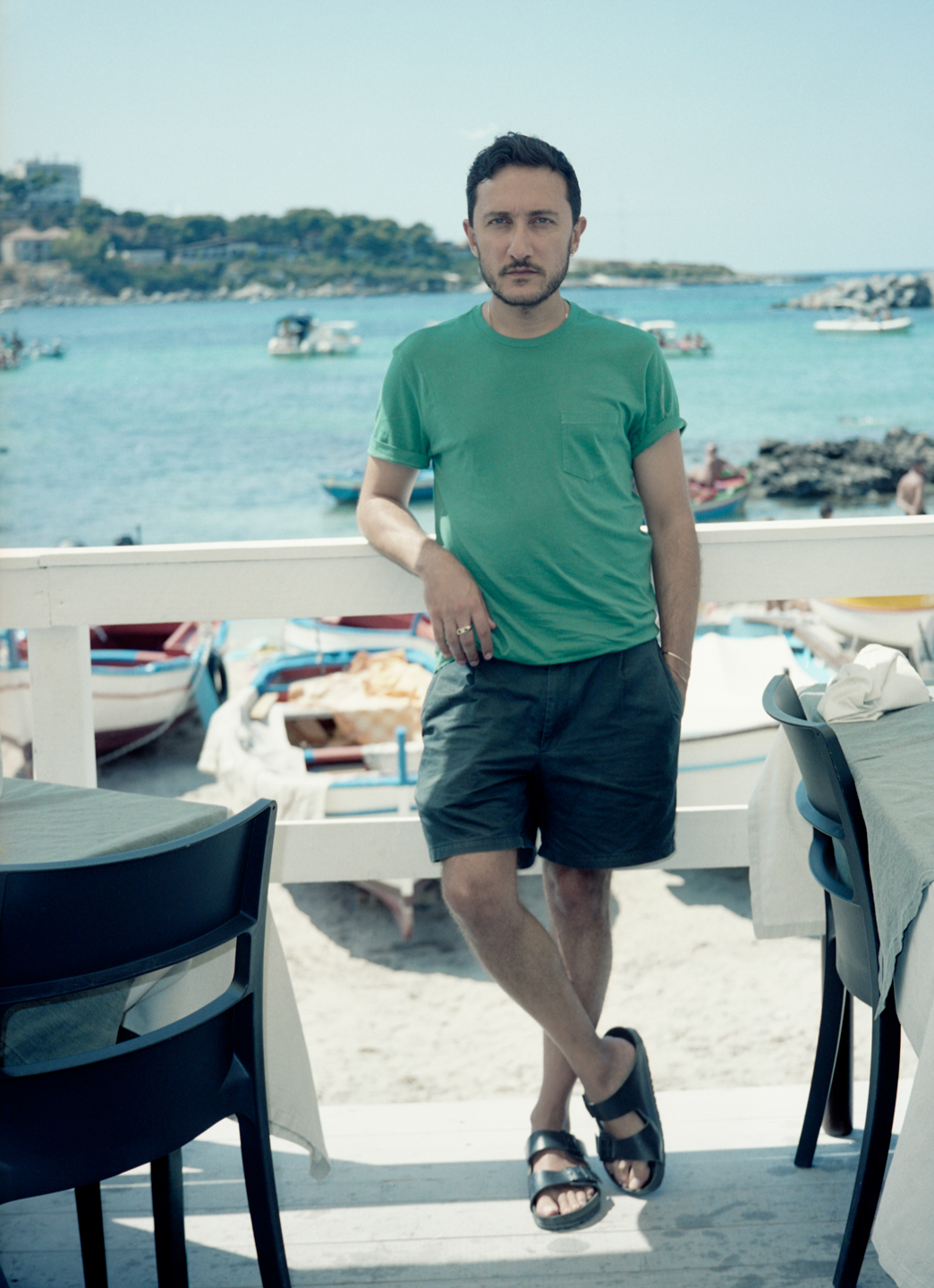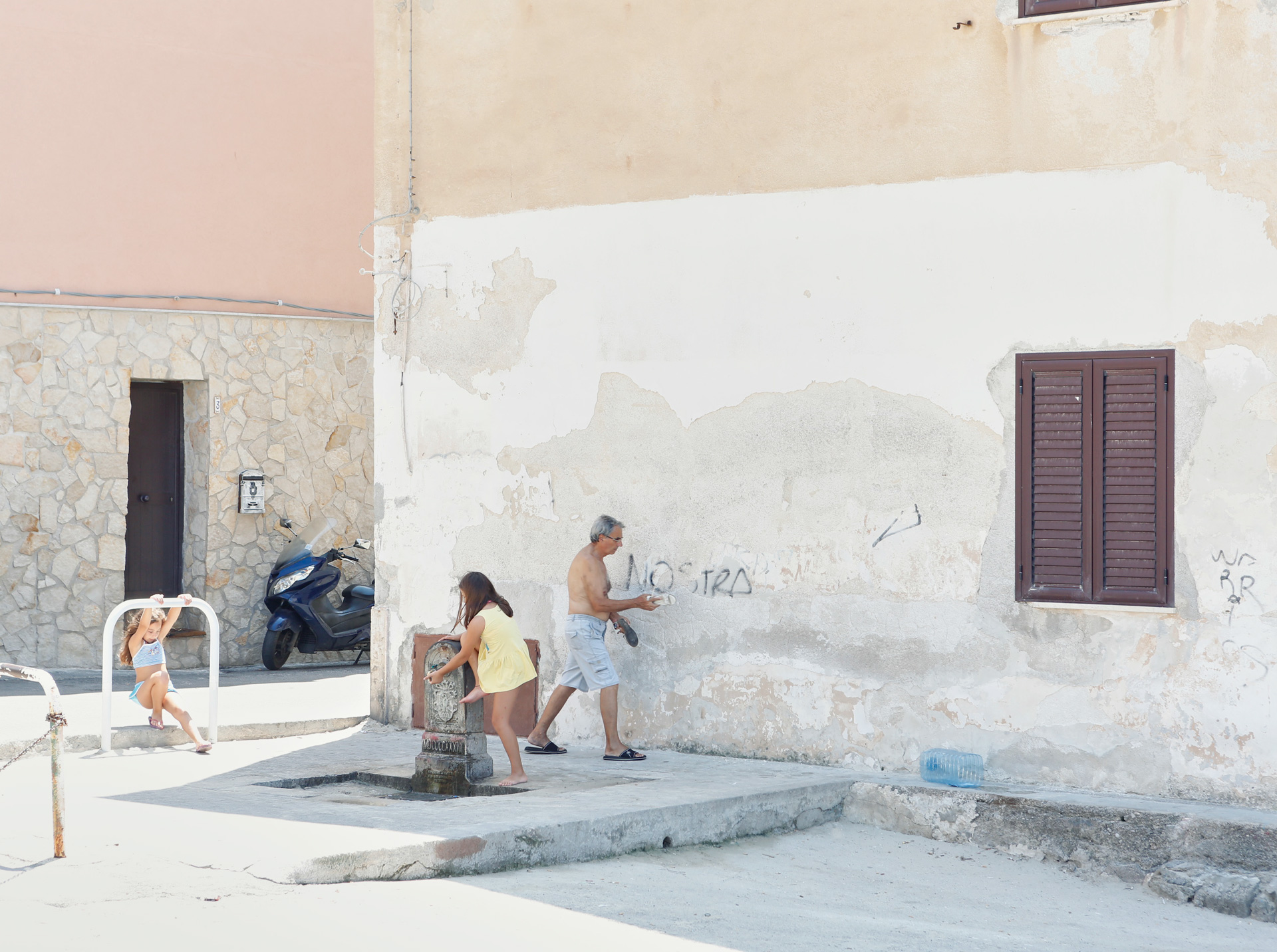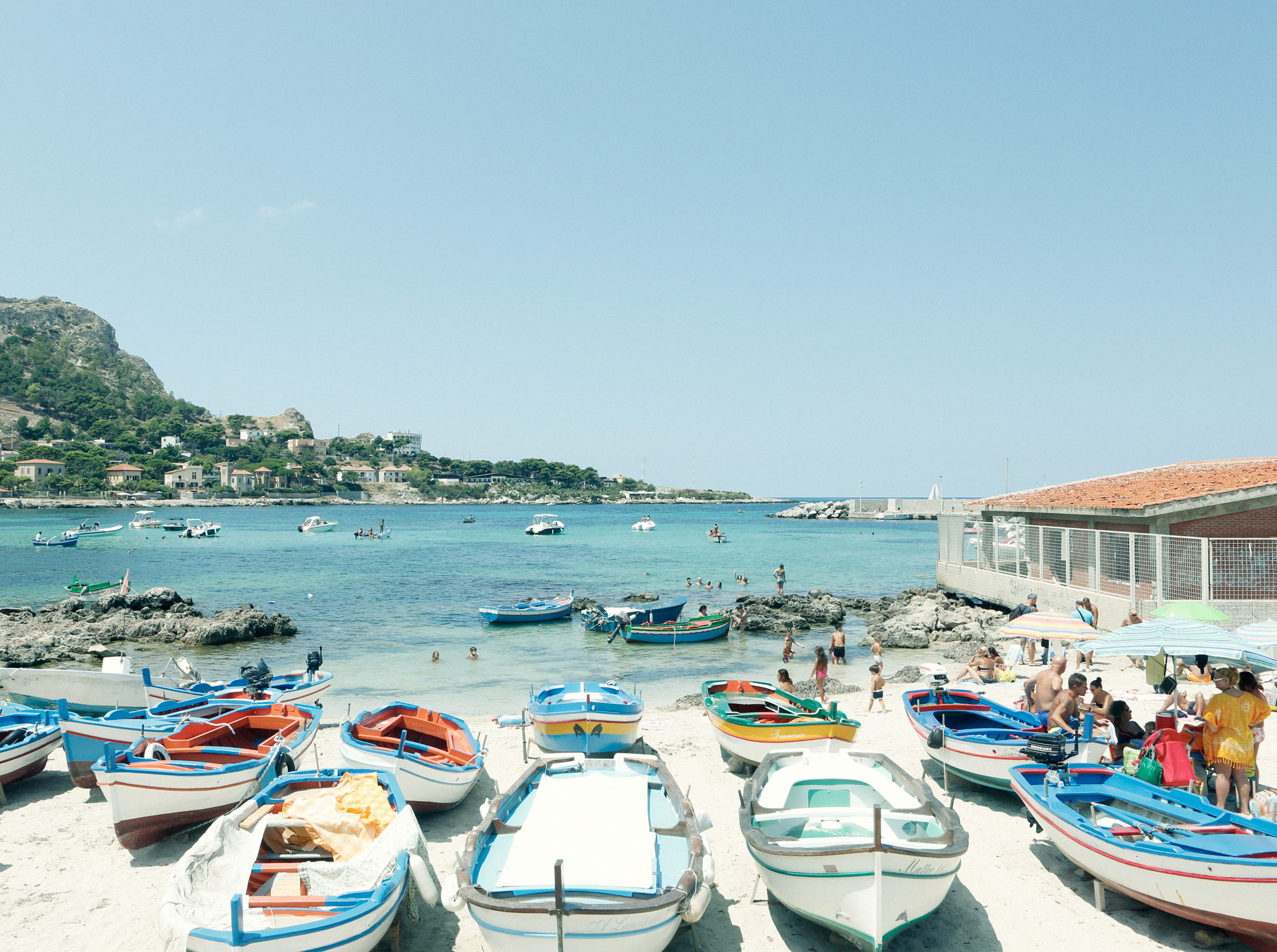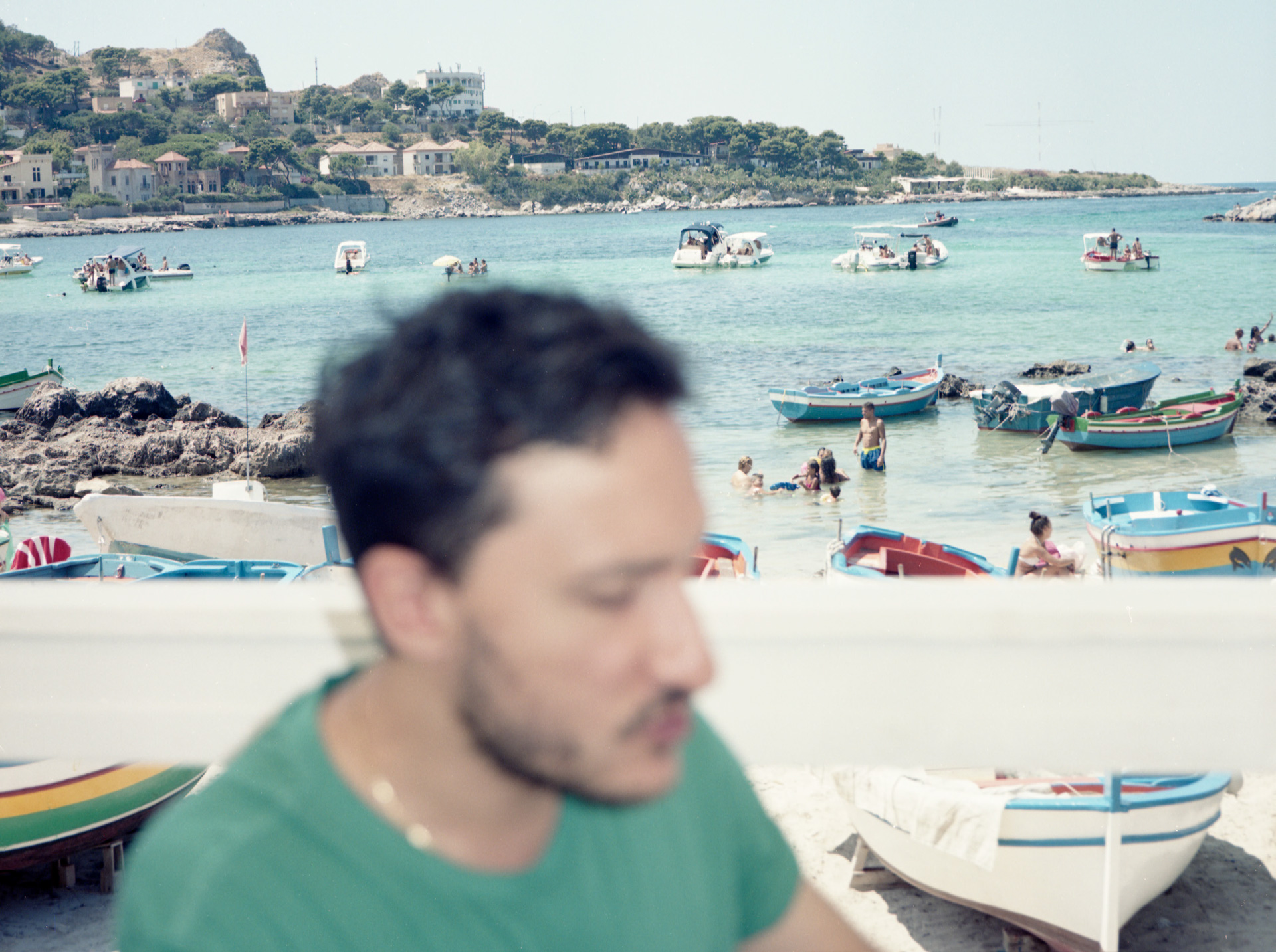Lunch with Marco de Vincenzo
At Capricci di Mare in Sferracavallo Palermo
Conversation with Fabiana Fierotti Photography Andy Massaccesi

-
FFHow long have you been in Palermo?
-
MDVI got here from Messina yesterday. I’d been there for a couple of days. This summer is all about Sicily for me, I hadn’t been back for a year.
-
FFReally? That’s almost unheard of for a Sicilian!
-
MDVMilan has become the location for family reunions since my brother is basically Milanese now. We had our first Christmas in Milan last year and afterwards I realised it had been over a year. I was really ready to reconnect with my city and my family when I arrived the other day.
-
FFAnd how do your parents handle the distance? Do they visit you?
-
MDVYes they visit often. I suppose they haven’t been up to much since we left. It’s very hard for them and they wait anxiously for moments like this when we come back.
-
FFSo I guess you still have your own room?
-
MDVIt’s exactly as I left it, with soft toys, post-its, books, all sorts, even Carmen Consoli’s autograph (famous Italian singer, ed.). I was 18 when I left and nothing has changed in 20 years. It’s crazy.
-
FFWhat did you do when you left home?
-
MDVI got my secondary school diploma in classical studies. I had come to the decision that I wanted to leave over the course of my time there. I knew what I wanted to do. And so I left straight away, I went to Rome. It was all predetermined…
-
FFWas your passion for fashion something that you inherited or something of your own?
-
MDVI have always had a strong passion for drawing which really took shape during middle school. Then I discovered fashion as a form of creative expression; when I invented something, I invented clothes. I had always drawn by copying from religious images or cartoons, then at some point clothes became my own original form of creativity. This remained a constant throughout secondary school and by the age of 18 I knew exactly what I wanted to do. I chose Rome because it was closer to my hometown: I was a little bit afraid of Milan and I visited home a lot. I didn’t leave Messina because I didn’t like it, only because I couldn’t do what I wanted there.
-
The waitress comes over to take our orders.
-
FFLet’s have a look at the menu! What shall we order? I’ll have the boiled octopus if it’s fresh.
-
MDVI think I’ll have the impepata di cozze to start and then perhaps a second course.
-
FFAnd I’ll follow with a first course, the lobster fettuccine.
-
MDVYou know what? I’ll have a first course too, the spaghetti with clams.
-
FFAnd we’ll have water and a glass of wine please.
-
MDVI made it to July by the skin of my teeth this year, I am constantly on the move. August is my only real break and then I have to recharge my batteries enough for a whole year.
-
FFIt’s a shame that holidays are concentrated in August in Italy, it’s hard to find any peace and quiet.
-
MDVYou have to balance how much you want to go home with how much you also want to go away somewhere else. You have to squeeze it all into three weeks and there’s just not enough time. I hope that at some point we can divide our holidays, a week in June, a week in July and two in August, which is how it works everywhere else.
-
FFMaking it to August every year must be extremely tiring for you, since you have the Fendi accessories to design as well as your own brand.
-
MDVYes. This year I finished Fendi and then moved north to near Cremona to work on my own collection… it’s an extremely stressful time, creatively speaking.
-
FFHow do you divide your creative intellect?
-
MDVThe truth is that when I decided to focus on my own brand, there was a certain perplexity, both on my part, because I didn’t know what was going to happen, and on the part of Fendi, where they wanted to see whether I would find a new equilibrium. In the end I realised that the creativity is the same, your source of inspiration has a single nucleus and then it splits. In any case, I create clothes for my brand and bags for Fendi so it’s two completely different areas. Then there are the codes of the brands themselves that direct you.
-
FFThere’s a commercial difference too…
-
MDVYes, there is more scope at Fendi where anything is possible, whereas my brand is small and I have to try and balance what I want with my economic possibilities. You have to use your ingenuity to make the most out of very little and that helps your creativity. On the other hand, Fendi gives me a chance to see things, to develop them and resize them for me. It is a very interesting exchange. It is important to work for a brand before starting your own project because it teaches you method and discipline. You work in an environment where roles are defined and you grasp how success is the fruit of various different steps. I think that made me feel more courageous, more instinctive. It made me take more risks with my own brand. I would recommend that everybody gains this solid foundation before starting out on a ‘solo’ adventure.
-
FFHow did you come into contact with the LVMH group?
-
MDVThey knew of my work for Fendi and my own independent work as well. When I was close to giving up, they found out and realised that this frustration could harm my career – when you decide to end a project that you truly believed in, there can be creative fallout – and how important it was for me to have some support in order to be able to give my all on all fronts. They didn’t want to lose me and they also thought that with some stimulus, my project could survive and grow. They believed in it so we started talking. It wasn’t easy of course, I had to maintain my role at Fendi and enter into partnership with them at the same time. I couldn’t believe it when we finally signed…

-
FFYou’ve had an unusual development for an “emerging” designer, which is almost an insult in Italy nowadays. All the emerging designers who everybody forgets about end up entering competitions, going on Vogue.it, making their name for a few months and then drop off the map.
-
MDVThe truth is that serious entrepreneurship doesn’t exist in Italy. I’ve met third-rate entrepreneurs who harmed me more than anything else. They are companies that expect immediate results and that’s just not possible. A new brand needs to spend to earn for the first five years at least. You have to invest in production, communication, loads of things. Then there are all the people you trust because you hope they can help you but it doesn’t work out that way. In my case, my collections were immediately well-received by the press and buyers. But due to unreliable producers, I missed deliveries to shops, I began to miss deadlines. You won’t ever be forgiven for that kind of thing, it is impossible to get your credibility back. I was only able to thanks to LVMH.
-
FFHow do you think your brand has changed, including in stylistic terms, after LVMH?
-
MDVI don’t have a reference world. I have always been an omnivore, I love everything and the opposite of everything. I never exclude anything. I like people to remember my collections; I want something to stick in people’s minds after four weeks of fierce fashion and input, even just a detail. Those expectations and that adrenaline have always inspired me. I definitely chose the most complicated path.
-
FFOf course. That’s the best way to challenge the fashion routine. You only make a mark when you don’t conform to expectations.
-
MDVThat’s the big secret to avoid finishing in a rush. Stretch the elastic that little bit further, it’s not always easy to understand. Sometimes it feels like meteors are overtaking you and you wonder why you aren’t a phenomenon, you wonder what’s happening.
-
FFWe’re in a period that is full of phenomena… Will it last?
-
MDVA phenomenon by definition needs to be replaced. It exists because it is part of that wave of innovation that the public needs every two years. The real challenge is opening a company and helping it grow in the healthiest, or most simple, way, with an eye on what’s happening around you yet without ever losing track of your own way. It’s as though somebody wrote the fashion rules in the last 10 years and you can’t make it unless you stick to them. There are no rules as far as I’m concerned, it would be like reading identical biographies of different artists, as though there was something that connected every success story when actually everybody has their own course of development. There are those who explode and then disappear, those who take off after their death, those who are always on the brink of success but never quite make it. There is variety.
-
FFWhat position do you think you hold within the Italian and international system?
-
MDVI love it when I am associated with creativity. I am very attentive to this aspect, I try to avoid the obvious. I step away from things that have been done before. People are beginning to appreciate this attitude and there is a growing energy around the brand. People say that I am quite bold, very Italian, that I maintain classic canons yet my Italian nature also drives me to explore and break the mould. This is the feel of the collection every year: fringing, fake fur and rainbow lurex. They begin to resemble one another but have a surprise effect even on me. I am often amazed how rewarding taking risks can be.
-
FFWhat is the first step when making a new collection?
-
MDVI don’t use mood boards. I place my trust instead on a week-long trip to visit any fabric suppliers that have aroused my interest and a group of suppliers that I know and trust and then I add the innovation. I come home full of ideas and fabric samples... what is unusual about this method is that if the trip had been different, the collection would be different. I find this really exciting, it is all “fate”. I come back with a sort of suitcase full of contrasts, I wait for them to emerge on their own and then I try to find the harmony between them, even if they’re not talking the same language. That’s the next step. The fact that I don’t have a narrative means I am free to say what I want without particularly precise references. It’s all about combination, like a puzzle. The story emerges at the end, with the stylist even. So many journalists tell me how hard it is to write about me. It’s an approach that I learned from Fendi. I want to release my ideas and see where they end up.

-
FFWhat role did Rome play in your development and career?
-
MDVIt was very important but I only realised this some time later, in Milan. Rome isn’t a fashion city historically, three of the most important companies in the world are based there now but it has no history in that sector so the people you meet after work don’t work in fashion. This means that you cultivate dreams and ideas, which then take seed in another environment. You don’t talk about fashion at dinner because it’s boring, which is not the case in Milan of course. Fashion is a distant concept in Rome. It was distant when I was in Sicily too, more real in my head than in real life. It’s quite a conflict to have something inside you but suppress it because nobody is interested. I lived half my life in Rome, it is my city, but a difficult city: very slow, chaotic, it hasn’t caught up in the way that was expected 10 years ago.
-
FFThe worse thing about Rome is the tourists; it’s a real invasion. That’s why I love the evenings there, when everybody is at dinner or in their hotels.
-
MDVIt is a literal invasion and visiting Milan, for the Romans, means feeling contemporary and up to speed. Milan feels like something else entirely, full of frenetic stimuli. It’s nice to go back afterwards and let that take root in Rome. Ideas are consolidated there.
-
FFYou also distance yourself from the city trends that are seen in every single collection during fashion week…
-
MDVI am not obsessed with trends so they have no effect on me. I think the word is losing its meaning. Rome is perfect for keeping all that at a distance so it doesn’t suffocate you.
-
FFHow do you split your life between Rome and Milan?
-
MDVIt’s very complicated because I’m always on the train, since there is no manufacturing in Rome. It’s harder, you have to be more organised. You never have a minute off from this job, not even on holiday. These are sacrifices you make because of who you are. You know that you are privileged and some sacrifices have to be made. I had my palm read as a child and I was told that my life line and work line coincided. I was 10 years old and I often think of it. It was true, I can’t tell one from the other.
-
FFDo you feel lucky to be in your current position?
-
MDVI think that doing something you really want to is the best situation to be in, because it doesn’t change you and it shows you that spontaneity will repay those sacrifices. My story hasn’t changed my values, you can do it if you persevere.
-
FFAny Italian brands you particularly admire?
-
MDVI am crazy about Prada, because they constantly reinvent themselves. “What will Prada do?” is the question on everyone’s lips during Fashion Week. Their approach to fashion has had a huge effect on my career: being so brave, so bold, so unpredictable. It’s the brand that I have always admired the most, even though I grew personally under names like Versace, which was crucial in developing my passion for this world. In general though I am more connected to foreign names. I like young, audacious designers. London gives us the best collections. I am a big fan of Christopher Kane for example.
-
FFJust any old name there (we laugh). Well, London is light-years ahead of Milan, which is just full of people saying “I could have done that” but they never do.
-
MDVI always think: why didn’t I think of that before! Italy has a lot to learn from abroad about being bold and courageous. Young people could and should be more courageous.
-
FFThen just think that we consider people over the age of 40 as “young designers”… It’s embarrassing not only for the designers, but the readers too.
-
MDVThat’s very true. I read that Alessandro Dell’Acqua is an emerging designer and I always wondered how he could stand it, given his past and the fact that he has been a consolidated designer for years now. I have always admired him as a designer, in part because of his difficult start.

-
FFHow was your own start? How did you decide to show in Paris?
-
MDVIt was about what was actually possible. I had 20 handmade dresses, a tailor friend and no real plan at an industrial level. I chose haute couture in Paris because it was the only thing that brought me out of my shell. Luckily some important people came to see my debut and things went from there. Milan has always been my goal though and I have always dreamed of transforming everything into pret-à-porter.
-
FFDo you think Milan is still competitive at an international level?
-
MDVThere is still a lot to do but something is happening. We need more support from the Chamber of Fashion, but it’s too complicated. It is difficult to form a team, the big brands won’t help you. I have asked for help with castings in the past, but nobody gave me a hand. I’m going to sound like a stalker now but Christopher Kane is my favourite. I trust him and I filter anything he does with benevolence. I like his approach, no matter what the results are. I wait for him every year and I hope to meet him soon.
-
FFWe’re being Milanese and talking about fashion. Fashion aside, what are your cultural references? Your current interests?
-
We laugh
-
MDVI have to say that my approach is very instinctive. Social media is a great source of research, especially Instagram. If I let myself browse, ignoring the propaganda and just letting myself go I find wonderful things. I have made random purchases just because I liked them. I like to see the effort in art, I am attracted by people who take their time to achieve a result. One of my great interests is reading and writing, which would have been my alternative job. My best friend, my classmate in secondary school, Nadia Terranova, is a writer. She published her first adult novel last year.
-
FFWow, you were both destined for greatness. How do you choose the books you read?
-
MDVMostly Nadia recommends books to me, otherwise I trust reviews and friends. I very rarely go into a bookshop without some idea of what I want.
-
Our food arrives
-
FFIt’s so lovely to see you so calm and serene when talking about your work. It’s very rare. Mostly when I interview people from fashion, it’s as though they’re saving the world.
-
MDVMy work is my refuge from everything else that happens in the world. I could be stripped of everything but never my desire to create. I find it impossible to make fashion if I’m stressed. I can’t stand people who think they’re doing something important. Fashion is extra, it’s entertainment. It doesn’t make any sense when it’s connected to anxiety, it’s evasion. Of course, it is also a serious job, you are under pressure, you have goals to meet, revenue to handle and so on but this should be dealt with calmly. My serenity has always saved me. I lose control if I’m not happy with what I’ve done. I become fragile when I receive criticism, when I have to accept it. If I’m convinced that I did the best I could, I can accept and work on negative feedback. If I feel that I’ve failed it’s very painful.
-
FFDo you read your reviews straight after the show?
-
MDVI read Vogue Runway as a habit, because it’s a fast review – the first to come out. Then I try and grasp what the energy is like around it. Business of Fashion is a fantastic publication. Then I look at social media, likes, followers etc.
-
FFDo you manage your own Instagram account?
-
MDVWe are trying to work that out, it needs to grow and therefore I need to delegate, but I need a strategy. I must say that Instagram is a good measure for how you are perceived, when you begin to exist on the market. There is a moment of complete satisfaction when you get a good review and at the same time you find out that somebody has bought and sold your collection.
-
FFWould you like to run an advertising campaign if you had the means necessary?
-
MDVVery much so. I try to document myself as much as possible but even I don’t take on the impossible: it’s just too expensive.
-
FFImportant things are expected from you, not so much in terms of budget but message and ideas.
-
MDVI have always wanted to wait until I felt ready, which is what I did with launching menswear, and now we’re doing it. We’ll open the first boutique in Paris in May and it’s the right moment. Everything comes gradually. The right moment will come for the campaign too. I definitely want to communicate more and more…
-
FFIt becomes a manifesto for what you do.
-
MDVI still feel too immature for that.
-
FFEveryone does it in their own time. I think Marni did it after 20 years.
-
MDVA campaign has value over time as well. In any case, I’m very focused on the menswear experiment at the moment. The moment to try it came naturally, I don’t know what will happen. I am beginning to think about the idea of a store, I am listening to lots of advice.
-
FFYou have a great passion for interns.
-
MDVI really like having interns and I am mistrustful of imposing people, so I prefer to have friendly and professional relationships where I can express my taste without being subjected to something that isn’t me.
-
FFIt can be very hard. What area of Paris will the store be in?
-
MDVNear Rue Saint-Honoré, it’s a small space that we just stumbled across.
-
FFThis is big news. Is there anything else?
-
MDVMy first collaboration with the theatre, for a show directed by Alfredo Arias in Naples and then Paris. It is a very interesting project, a show for the theatre made by people who don’t work in theatre.

-
FFHow will you spend the next few days in Palermo?
-
MDVThis summer is devoted to my parents who I never see. I will spend a few days in Palermo, then I’ll leave again, then come back. I want to give them a sensation of proximity, leaving and returning so as to create a gradual departure.
-
FFHow old are your parents?
-
MDV64 and 70 years old. They feel quite abandoned so I try to be close to them. I haven’t organised anything too far away from them and I’m happy in Sicily anyway. I didn’t know Palermo until last year actually, I discovered it very late.
-
FFIt’s only when you leave Sicily that you realise you don’t know much about it.
-
MDVYes I was horrified to hear people who weren’t from Sicily talk about places that I’d never seen. It weighed on my mind and I decided to study so I could be prepared. I want to know my land well and this summer will be dedicated to exploring. I want to rediscover my Sicilian side.
-
FFIt’s true that you are not immediately associated with Sicily, as is the case for other designers.
-
MDVI am often defined Roman which I don’t mind, but I’m Sicilian and I feel that.
-
FFFrom a unique and tough city like Messina too!
-
MDVYes, a city with a hard history that’s destroyed it. Now when I return from Palermo to Messina, I can see similar aspects, especially from the twentieth century onwards. I am shocked at how similar it is. My dream would be to have my own place in Sicily, a house where I could escape to during the year. A refuge to hide in every so often. I would like to be close to my city so I felt I belonged, as well as for its sea and breathtaking landscape. I have started looking and I hope to find something soon.